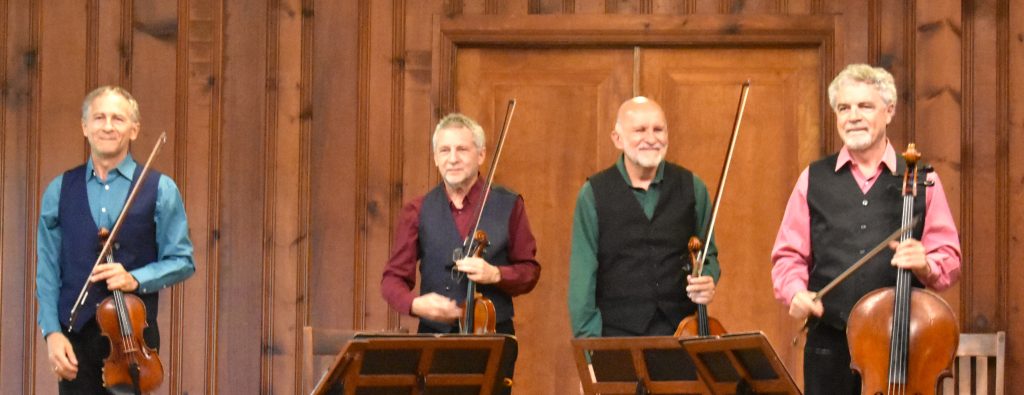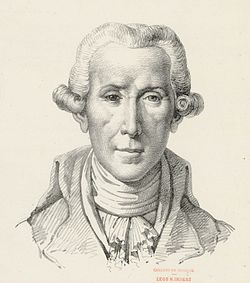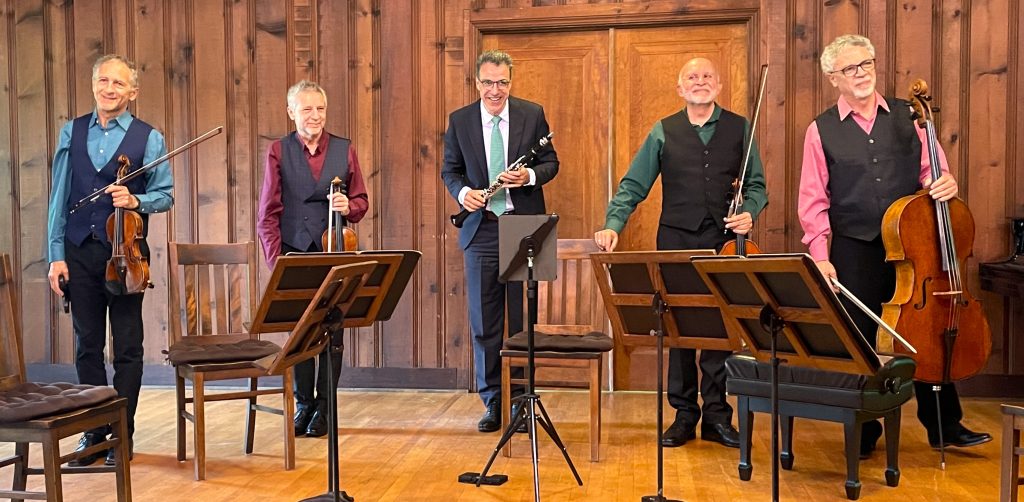
by Kevin T McEneaney
One of the globe’s greatest quartets, Cuarteto Latinoamericano, which has published over a hundred CDs, performed a selection of well-known and unfamiliar compositions with thrilling éclat! The quartet, which has been in existence for 42 years, consists of lead violinist Saúl Bitrán, second violinist Arón Bitrán, violist Javier Montiel, and cellist Álvaro Bitrán. The quartet is noted for bringing to the forefront a rich tapestry of little-known, important works by Latino composers.
They opened with String Quartet in A Major, G.206 (1780) by Luigi Boccherini (1743-1805), who was born in Lucca, Italy. Along with Haydn, Boccherini was an early champion of the quartet and the inventor of the quintet. As the leading cellist of his era, he established the importance of the cello. In his many quintets, he had a second cello which was tuned halfway between the first violin and the cello.

In the first movement, the quartet tells the happy story of his courtship and first marriage. The second movement is a lamentation for the early death of his first wife, and here, cellist Álvaro Bitrán excelled. The optimistic Presto that concludes the composition recounts his determination to discover a satisfactory second wife, which he eventually did. Such is my interpretation.
A little over Boccherini 500 compositions have survived, although many of his more eccentric masterpieces were destroyed by his very conservative Parisian publisher. The quartet delivered an immaculate performance that foregrounded the emotional tenor of this charming autobiographical work.Due Canzoni Messicane (2010) by Stefano Scodanibbio (1956-2012) featured two classical compositions based upon two popular folk songs. The first illustrated a longing for love that had a happy conclusion; the second was a glowing memory piece of a happy love that featured redolent harmonies. Both were exquisitely lyrical.

Fantasia by Gonzalo Castellanos Yumar (1926-2020) described a romance from the point of view of each sex, the first perspective being male, then the second being female. This was a memory composition that glowed with charm.
Clarinet Quintet (1994) by Joaquin Gutiérrez Heras (1927-2012) featured Oskar Espina Ruiz on clarinet. In contrast to the folk music motifs, this was an abstract, atonal work by a noted Italian composer who spent much of his life in Mexico and died there. The opening was sad with the clarinet lamenting, then the composition turned to emotional longing and searching. The finale was extraordinary, with all five instruments delivering tension and terse suspense; the thrilling, emphatic finale was repeated twice. Saúl Bitrán on first violin was truly astonishing, while Oskar on clarinet was hauntingly memorable.

After Intermission, they reassembled to perform Clarinet Quintet in A Major, K. 581 (1789) by Wolfgang Amadeus Mozart (1756-1791). Mozart wrote this enduring masterpiece for his fellow Mason Anton Stadler. The smooth lyrical modality of this work remains intoxicating. This is the only one of Mozart’s compositions for a wind soloist with strings that appear in four movements. The first violin and viola resound as a delightful duo in the middle of the work. The warm themes of the clarinet in this notably ravishing work are woven like an exuberant marriage bond in this performance. It was as if Oskar had been playing for years with these four talented musicians!
The audience exploded with frenetic applause. For an encore, they repeated the final memorable movement, as in the Clarinet Quartet by Heras. This was a concert that shimmered with variety and lyric panache!

Next Sunday at 3 pm, the Ulysses Quartet & Max Levinson, Piano:
Jessie MONTGOMERY “Voodoo Dolls”
Mieczysław WEINBERG Capriccio, Opus 11
Ludwig van BEETHOVEN String Quartet in B Flat Major, Opus 18/6, “La Malinconia”
César FRANCK Piano Quintet in F Minor, Opus 14